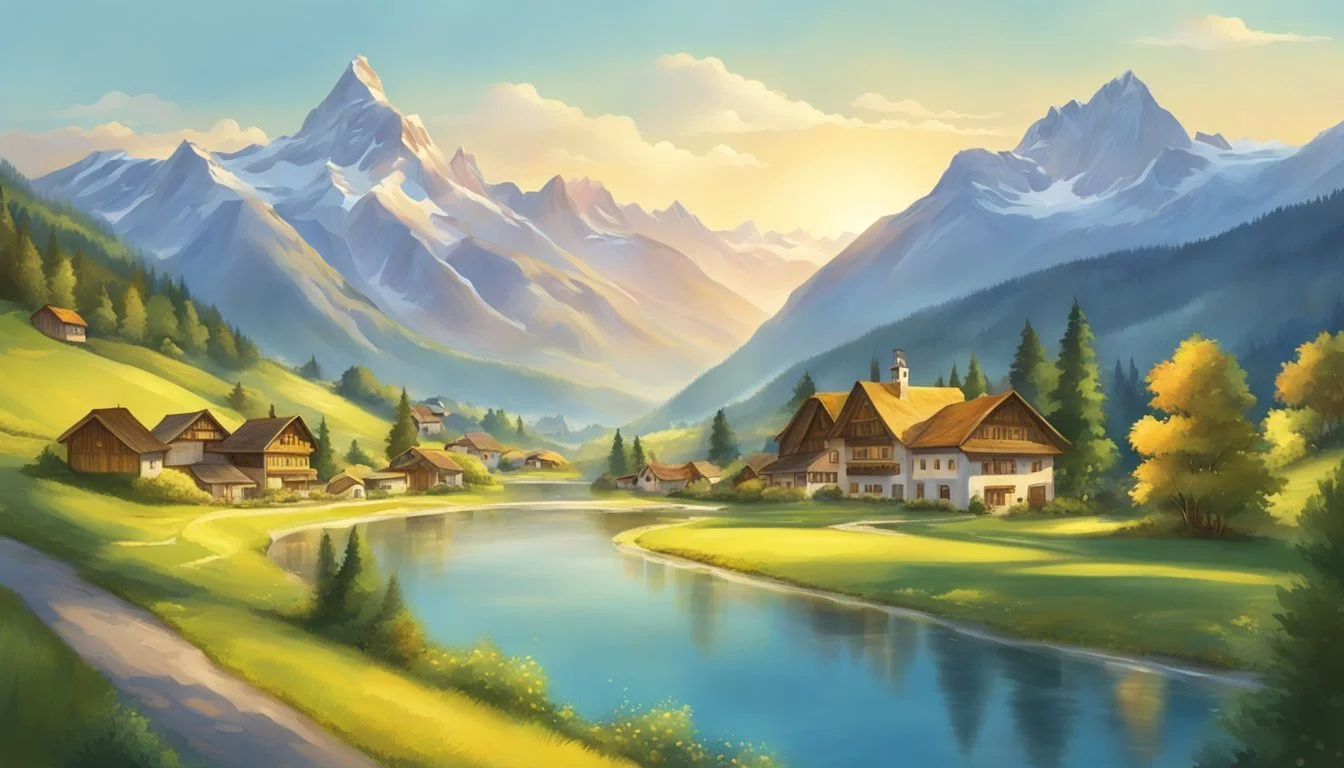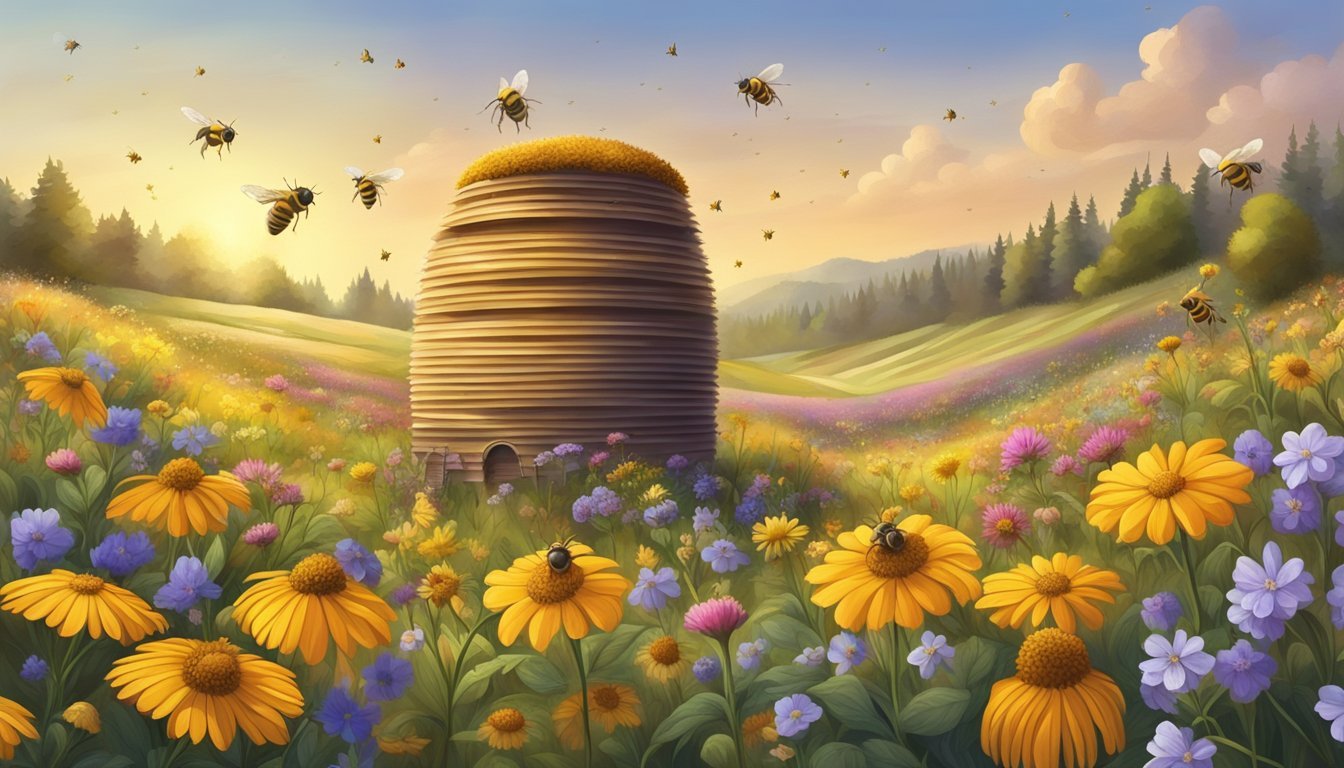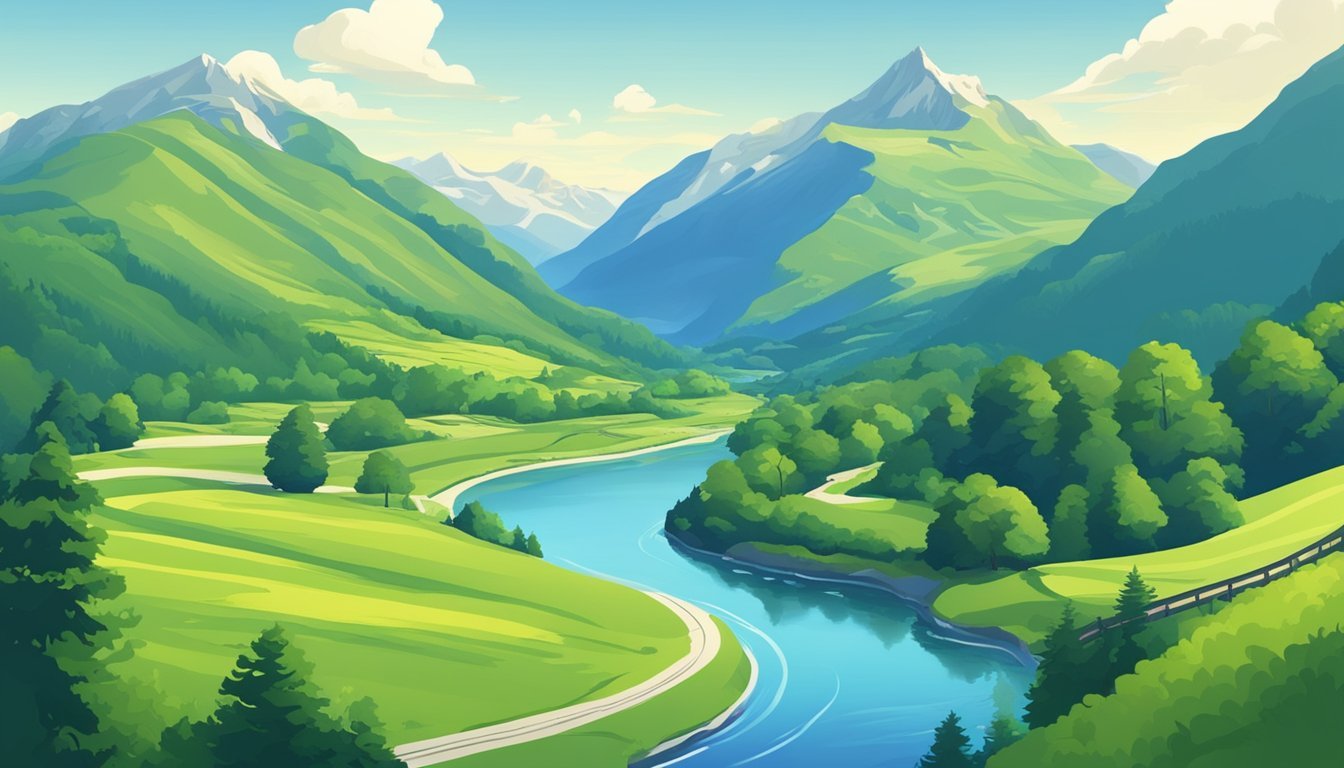10 Insightful Documentaries on Switzerland
Unveiling the Alpine Nation's Hidden Depths
Switzerland, a small Alpine nation, captivates with its stunning landscapes, rich culture, and unique history. From snow-capped peaks to serene lakes, the country offers a diverse tapestry of natural beauty and human achievement. Documentaries provide an excellent medium to explore the many facets of this fascinating land.
These films offer viewers a chance to delve into Switzerland's natural wonders, innovative spirit, and complex social fabric. They showcase the country's breathtaking scenery, examine its renowned neutrality and banking sector, and highlight its multilingual populace. Through insightful documentaries, audiences can gain a deeper understanding of Switzerland's place in the world and the factors that have shaped its distinct identity.
1) 'The Swiss Touch in Landscape Architecture' - Michael Bierut
This documentary explores Switzerland's significant contributions to landscape architecture over the past two centuries. It showcases the country's innovative approaches to garden and landscape design, highlighting how Swiss designers have shaped outdoor spaces.
The film examines various projects that demonstrate the Swiss influence on landscape architecture. It features interviews with prominent Swiss landscape architects and garden designers, providing insights into their creative processes and design philosophies.
'The Swiss Touch in Landscape Architecture' delves into the political, aesthetic, and social aspects of landscape design in Switzerland. It illustrates how Swiss landscape architects have addressed environmental concerns and integrated sustainable practices into their work.
The documentary also explores notable Swiss landscape projects, such as public parks, urban green spaces, and private gardens. It examines how these designs reflect Switzerland's unique cultural and geographical characteristics.
Michael Bierut's film offers a comprehensive look at Switzerland's role in shaping modern landscape architecture. It presents a visual journey through some of the country's most impressive and influential landscape designs, showcasing the precision and innovation that characterize the Swiss approach to outdoor spaces.
2) 'The Alps from Above' - Petra Höfer
'The Alps from Above' offers a breathtaking aerial journey across Europe's iconic mountain range. This nine-part documentary series, directed by Petra Höfer, provides viewers with a unique perspective on the Alps' stunning landscapes and diverse communities.
The series traverses the entire Alpine region, from Slovenia to Switzerland, showcasing the natural beauty and cultural richness of the area. Spectacular footage captures shimmering lakes, ancient castles, and awe-inspiring vistas from high above.
Höfer's documentary doesn't just focus on scenery. It also explores the lives of people and animals that call the Alps home. Viewers are introduced to various inhabitants and their unique ways of life in these mountainous regions.
One episode visits an inn situated at over 3000 meters above sea level, demonstrating the extreme conditions in which some Alpine residents live and work. Another segment highlights one of the world's highest beekeeping operations, showcasing the ingenuity of mountain dwellers.
The series also touches on lesser-known aspects of Alpine life, such as strange stone instruments and a lake housing a massive 40-year-old fish. These intriguing details add depth to the visual splendor of the aerial footage.
3) 'More than Honey' - Markus Imhoof
'More than Honey' is a captivating documentary directed by Swiss filmmaker Markus Imhoof. Released in 2012, this film offers a deep exploration of honeybee colonies across the globe.
The documentary takes viewers on a journey through California, Switzerland, China, and Australia, showcasing the intricate world of bees. Imhoof's work combines scientific insights with stunning visuals, providing a comprehensive look at these vital insects.
'More than Honey' received critical acclaim and numerous accolades. It won the Swiss Film Award for Best Documentary in 2013 and was Switzerland's official entry for the 86th Academy Awards in the foreign language category.
The film addresses the crucial role bees play in our ecosystem and the challenges they face. It features interviews with beekeepers, scientists, and other experts in the field, offering diverse perspectives on bee populations and their importance.
Imhoof's documentary stands out for its use of advanced filmmaking techniques to capture the bees' world in extraordinary detail. This approach allows viewers to witness the complexity of bee colonies and their behaviors up close.
4) 'Heidi's Land' - Yoshiko Heino
'Heidi's Land' is a documentary that explores the real-world inspirations behind Johanna Spyri's beloved children's novel. Directed by Yoshiko Heino, the film takes viewers on a journey through the picturesque Swiss region known as Heidiland.
The documentary showcases the stunning Alpine landscapes that serve as the backdrop for Heidi's adventures. Heino captures the essence of the area, from its lush meadows to its towering peaks, bringing the fictional setting to life.
Viewers are introduced to Maienfeld, the village that inspired Spyri's story. The film explores how this quaint Swiss town has embraced its literary heritage, including the creation of Heidi Village, a popular tourist attraction.
'Heidi's Land' also delves into the cultural impact of Spyri's tale. It examines how the story has shaped perceptions of Switzerland and influenced tourism in the region.
Heino's documentary provides insights into the enduring appeal of Heidi's story. It explores themes of childhood innocence, the healing power of nature, and the simple joys of rural life that resonate with readers worldwide.
5) 'Swiss Army Man' - Daniel Scheinert & Daniel Kwan
'Swiss Army Man' is a unique and thought-provoking film directed by Daniel Scheinert and Daniel Kwan, collectively known as "The Daniels." This surrealist comedy-drama premiered at the 2016 Sundance Film Festival, generating significant buzz and diverse reactions from audiences.
The film stars Paul Dano and Daniel Radcliffe in unconventional roles. It explores themes of human connection, loneliness, and the meaning of life through a peculiar lens. The directors' creative vision blends humor and emotion in unexpected ways.
Scheinert and Kwan, known for their innovative music videos, brought their distinctive style to their feature film debut. Their approach to storytelling challenges conventional narrative structures and pushes boundaries in cinema.
'Swiss Army Man' showcases the directors' ability to tackle profound subjects with a mix of absurdity and sincerity. The film's originality and boldness in execution demonstrate the Daniels' willingness to take risks in their artistic endeavors.
While not a traditional documentary, 'Swiss Army Man' offers insights into human nature and societal norms through its unconventional storytelling methods. The film serves as a testament to the directors' unique creative vision and their ability to provoke thought and discussion.
6) 'Fermented' - Jonathan Cianfrani
'Fermented' is a documentary directed by Jonathan Cianfrani in 2017. The film follows chef Edward Lee on a culinary journey exploring the ancient process of fermentation in modern cuisine.
Lee delves into the beauty of rot and how fermentation is used both at home and abroad. The documentary showcases various fermented foods and their roles in different cultures.
Cianfrani's film highlights the intersection of traditional fermentation methods and contemporary innovations. It examines how these techniques have evolved and adapted over time.
'Fermented' premiered at the Seattle International Film Festival on May 29, 2017. The documentary runs for 68 minutes and was produced by Zero Point Zero Production Inc.
While not specifically about Switzerland, this film offers valuable insights into global culinary practices. It demonstrates how fermentation transcends geographical boundaries and influences diverse cuisines worldwide.
7) 'The Divine Order' - Petra Volpe
'The Divine Order' is a compelling film directed by Petra Volpe that sheds light on Switzerland's late adoption of women's suffrage. Set in 1971, the movie follows Nora, a housewife in a conservative Swiss village, as she becomes an unlikely activist for women's voting rights.
Volpe's work skillfully portrays the societal resistance to change in rural Switzerland. The film illustrates how some political leaders used the concept of "Divine Order" to justify denying women the right to vote.
Through Nora's journey, viewers witness the awakening of a quiet housewife into a determined suffragette. The narrative explores the challenges faced by women fighting for equality in a traditional society.
'The Divine Order' blends historical context with personal stories, making the political struggle relatable. It showcases the ripple effects of the women's liberation movement reaching even the most remote parts of Switzerland.
Volpe's direction brings a balance of humor and gravity to this important chapter in Swiss history. The film serves as both entertainment and a reminder of the relatively recent nature of women's suffrage in Switzerland.
8) 'Swiss Re Grand' - Daniel Schwartz
Daniel Schwartz, a renowned Swiss photographer, captures the essence of Switzerland in his documentary 'Swiss Re Grand'. The film showcases Schwartz's unique perspective on the Alpine country's landscape and architecture.
Schwartz's work is rooted in humanist tradition and guided by a deep sense of history. His photography often focuses on documenting environmental changes, particularly the effects of global warming on glaciers.
In 'Swiss Re Grand', Schwartz turns his lens to the iconic Swiss Re building in Zurich. The documentary explores the architectural marvel's impact on the cityscape and its significance in modern Swiss culture.
Schwartz's keen eye for detail and composition shines through in every frame. He expertly balances the sleek lines of the Swiss Re building against the backdrop of Zurich's historic architecture.
The film also touches on the broader themes of urban development and the changing face of Switzerland. It offers viewers a thought-provoking look at how contemporary structures like Swiss Re Grand are shaping the country's identity.
'Swiss Re Grand' stands as a testament to Schwartz's ability to create visually striking and intellectually engaging documentaries. It provides a unique window into Switzerland's evolving landscape and architectural heritage.
9) 'Sister' - Ursula Meier
'Sister' is a compelling 2012 Swiss drama film directed by Ursula Meier. Set against the backdrop of a ski resort, the film explores the complex relationship between a young boy and his older sister.
The story focuses on 12-year-old Simon, who steals equipment from wealthy tourists to support himself and his sister Louise. Their impoverished life in the valley contrasts sharply with the affluent world of the ski resort above.
Meier's direction skillfully captures the stark socioeconomic divide between the characters' two worlds. The film's nuanced portrayal of family dynamics and survival in difficult circumstances earned it critical acclaim.
'Sister' competed at the 62nd Berlin International Film Festival, where it won the Silver Bear Special Award. It was also selected as Switzerland's entry for the Best Foreign Language Oscar at the 85th Academy Awards.
The film features strong performances from its lead actors, Kacey Mottet Klein as Simon and Léa Seydoux as Louise. Their on-screen chemistry brings depth and authenticity to the siblings' complex relationship.
10) 'The Day the Sun Fell' - Aya Domenig
'The Day the Sun Fell' is a poignant documentary by Swiss-Japanese filmmaker Aya Domenig. Released in 2015, the film explores the aftermath of the 1945 atomic bombing of Hiroshima.
Domenig's personal connection to the subject matter stems from her grandfather, who worked as a Red Cross doctor in Hiroshima during the bombing. The director embarks on a journey to uncover her grandfather's experiences through the stories of survivors.
The documentary features interviews with a doctor and former nurses who lived through the catastrophic event. These firsthand accounts provide unique insights into the immediate and long-term impacts of nuclear warfare.
Domenig's film also touches on the more recent Fukushima nuclear disaster, drawing parallels between the two events. This connection highlights the ongoing relevance of nuclear safety in Japan and globally.
'The Day the Sun Fell' received critical acclaim for its sensitive approach to a challenging topic. The film's intimate perspective offers viewers a deeply human look at one of history's most devastating moments.
The Impact of Swiss Documentaries
Swiss documentaries have shaped public discourse and influenced global perspectives on Switzerland's culture, society, and natural environment. These films offer unique insights into Swiss life and values.
Cultural Reflections
Swiss documentaries serve as mirrors reflecting the nation's cultural identity. They explore themes like Swiss neutrality, direct democracy, and multilingualism. Films like "Mani Matter" (2002) by Friedrich Kappeler showcase iconic Swiss figures, connecting audiences with their cultural heritage.
These documentaries often highlight Switzerland's natural beauty. "Wild Switzerland" captures the country's untamed wilderness, showcasing alpine meadows, rugged cliffs, and pristine lakes. Such films foster national pride and environmental awareness among Swiss citizens.
Many documentaries delve into Switzerland's traditions and innovations. They examine the country's renowned banking sector, precision watchmaking, and scientific advancements. This balanced portrayal helps Swiss viewers understand their nation's strengths and challenges.
Global Influence
Swiss documentaries have garnered international recognition, shaping global perceptions of the country. They offer foreign audiences a nuanced view of Switzerland beyond stereotypes of chocolates and ski resorts.
These films showcase Switzerland's humanitarian efforts and diplomatic role on the world stage. Documentaries exploring Swiss neutrality and international organizations based in Geneva educate viewers about the country's global contributions.
Swiss nature documentaries, with their stunning visuals of the Alps, have inspired eco-tourism and conservation efforts worldwide. They promote Switzerland as a destination for nature lovers and outdoor enthusiasts.
Some Swiss documentaries address global issues like climate change, using Switzerland's changing landscape as a case study. This approach helps international audiences connect with environmental challenges on a more personal level.
Cinematic Techniques in Swiss Documentaries
Swiss documentaries employ unique storytelling approaches and visual aesthetics to capture the essence of their subjects. These techniques blend traditional and innovative methods to create compelling narratives.
Storytelling Approaches
Swiss documentarians often use a observational style, allowing events to unfold naturally on camera. This approach creates an intimate, unfiltered view of Swiss life and culture. Many films incorporate interviews with local experts and residents, providing authentic perspectives.
Some documentaries utilize historical footage and archival materials to contextualize modern issues. This technique bridges past and present, offering viewers a comprehensive understanding of Swiss history and its impact on contemporary society.
Narrative voiceovers are frequently employed to guide viewers through complex topics. These voiceovers are typically delivered in a neutral, informative tone, aligning with Switzerland's reputation for objectivity.
Visual Aesthetics
Swiss documentaries often showcase the country's stunning landscapes through sweeping aerial shots and time-lapse photography. These techniques highlight the natural beauty of the Alps, lakes, and forests.
Filmmakers frequently employ close-up shots to capture intricate details of Swiss craftsmanship, from watchmaking to cheese production. This visual approach emphasizes the precision and quality associated with Swiss products.
Many documentaries use a muted color palette, reflecting the understated elegance of Swiss design. This aesthetic choice creates a cohesive visual style that complements the subject matter.
Dynamic camera movements, such as tracking shots through city streets or along mountain paths, immerse viewers in the Swiss environment. These techniques provide a sense of movement and exploration, inviting audiences to experience Switzerland firsthand.






